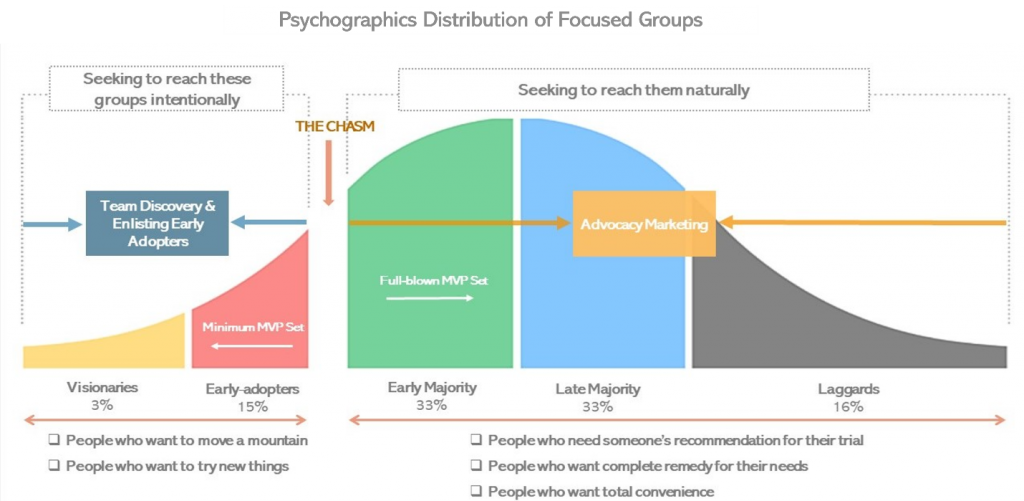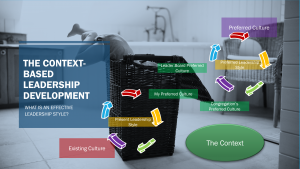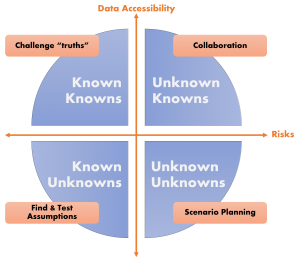When adopting the Just-in-time ministry model, the second paradigm shift is to radically narrow down your focused groups to become more inclusive, relevant, and diverse. It sounds paradoxical. Let’s explore this contradictory proposition and how to achieve them with three tactics. In case you didn’t read my previous posts on “Just-in-time ministry (Part I)” or “Just-in-time ministry (Part II),” please read them first.
Inclusivity, Diversity, & Cultural Competency is a PROCESS
- The first tactic is to enlist early adopters ONLY for your new community development projects.
- Second, you should narrow down your target audience further with a set of your ministry value propositions targeting their specific needs.
- Third, invite those first with “Mosaic” lifestyles matched with the dominant Mosaic lifestyles of your congregation. I will handle this third one in another post.
It might sound rather exclusive than inclusive. A need for greater diversity may seem ignored. You must see here that I am intentionally adding more constraints to the equation of the community engagement projects for you to have a moment of clarity about them. Without the right set of rules, which can further refine the direction of the aim, it might be aiming at things without a target. Fostering diversity and inclusivity in your congregation is an experiential journey and a process. It is far more than just stating your standpoint. When your community outreaching projects have evolved into the next rounds using these tactics (or through the I.G.N.i.T.E. ministry diffusion framework designed based on the tactics ), you will realize:
- These constraints help your congregation suddenly mobilize the stagnant community projects into a relevant community engagement since you have a specific target of the focused group. You can develop a professional ministry targeting the concentrated target group. It would be easier to entertain and surprise several with a banquet than to feed five thousand.
- Your congregation, as they repeatedly employ the tactics, would make slow but definite progress in adding multi-dimensional receptors to your community that can sensitively respond to the real need of a specific group and builds up relevant relationships with them with a set of attractive ministry value propositions.
- Moreover, your ministry team would master how to reach a specific group of early adopters wanting to try new ministry offerings for their underserved needs. They would feel safe, invited, welcomed, and belong to your congregation.
Tactic 1 – Enlist early adopters only for your new community engagement
Let’s explore the first tactic here. When you start a new community-centric project, you should focus on inviting early adopters only in the initial round of your ministry project. Especially when your congregation is relatively scarce of cultural competencies, creating a full-blown ministry seeking to reach everyone is out of the question. Let’s take a close look at the psychographic distribution of the U.S. population. There are three groups sensitively reacting to any organization’s services’ quality, convenience, and total benefits. They are called “early majority,” “late majority,” and “Laggards.” They comprise about 82% of the U.S. population. They are not easily content with new programs and services unless they have proven superior to existing ones. They are critical of professional quality and demand more benefits, so-called delight factors: something unexpectedly satisfying. They have been somewhat spoiled by those outstanding emerging companies’ state-of-art services and products. They are those who give one or two-star ratings on Google reviews unless they are delighted. A bad online review could destroy your ministry overnight when about 93% of U.S. adults today begin their online experiences with online searches. The search engine result pages show the top contenders with an option to filter out the result according to the rate of reviews. People don’t even consider visiting your website unless your site has the highest rate. The best way to reach out to these groups is through advocacy ministry marketing. I will have a separate post allocated on this topic. Unless they know the proven-track of the services, they never consider trying out your ministry programs without a strong recommendation from someone they trust. I will talk about content ministry marketing using influencers in another post.

Unlike three groups, early adopters play a crucial role in co-creating community engagement. About 15% of the U.S. population belongs to this group. They are geared toward new things. The newness is the prime factor for their satisfaction. The long track, the high quality, or the delight factors are secondary. As long as their prime desire and needs are met, they highly evaluate your efforts and recommend their friends to your community engagement programs. They are not shy about giving their feedback about your programs. You should first invite and enlist this group of people to co-organize and develop your programs further. The initial participants play a crucial function in feeding back their actual experiences to the ministry programs. The honest feedback helps you further realign your program by adding, getting rid of, and modifying your ministry value propositions. The continuous realignment would take your community engagement into the next stage with the broader target audiences.
Closing
We have examined the first tactic for the second paradigm shift needed for the Just-in-time ministry that churches should pursue community engagement with people thriving in the digital culture. It was to seek to reach early adopters first for your new engagement initiatives with the local community. How can we intentionally reach early adopters? It takes the art of communications. I want to talk about it in my next post before continuing to the rest of the Just-in-time ministry.






